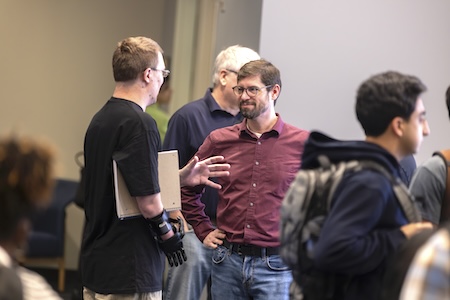
Professor's CNBC Course Highlights College’s Leadership in Expanding AI Literacy
If you’re worried about artificial intelligence (AI) taking your job, Georgia Tech’s Mark Riedl says that probably won’t happen. However, losing your job to someone who knows how to leverage AI tools in the workplace is something to be concerned about.
To help people beyond campus understand what AI tools are available and how to use them effectively, Riedl recently co-taught an online course by CNBC Make It titled How to Use AI to Be More Successful at Work.
“The running joke right now is that AI will not replace people, but people who use AI will replace people who do not use AI,” said Riedl, professor in the School of Interactive Computing.

The 90-minute course offers tips and hacks to users who are:
- Inexperienced in using AI tools in the workplace and are looking to grow in professional development
- Small business owners who are overwhelmed with administrative tasks, marketing, industry research, and data analysis
- Job seekers looking to stand out from the crowd
- People seeking to improve their work-life balance
Riedl, whose research focuses on human-centered and explainable AI, taught sections of the course on the foundation of AI. One of the biggest sections of the course covers large-language models (LLMs).
“When large language models were put forward as chatbots, this was the first time that any person out in the world could naturally interact with an AI system without having to learn to program or write code,” Riedl said.
For less than $100, the on-demand course includes a detailed workbook that helps users consider each aspect of their jobs and daily lives and how AI can improve them.
The Big Picture
CNBC’s use of Riedl’s expertise is one of many examples of how College of Computing faculty are leading the way in teaching AI literacy.
David Joyner, executive director of online education, said Georgia Tech’s Online Master of Science in Computer Science (OMSCS) program continues to innovate with AI literacy in mind.
[RELATED: Experts Say Life-long Learning is a Must to Keep Pace with Generative AI]
He said companies and employees alike are learning to navigate AI. Companies are considering AI from a general perspective, focusing on how it can make their businesses more efficient, while employees are using it to become more versatile and valuable workers.
“It’s an interesting dichotomy,” Joyner said. “If companies are trying to figure out how to operate more efficiently, and you have people using these tools to be more productive, at what point does the company need to prioritize using these tools instead of letting their use be organic? We’re still in this experimental phase.”
In a conversation with former College of Computing interim dean Alex Orso, Joyner discusses how OMSCS is staying at the forefront in equipping students with the latest technology skills they need to be successful in a fluctuating industry.
“We must figure out what generative AI can do well and properly leverage it so we’re not cutting out the foundation of a building and replacing it with sticks,” Joyner said.
The complete conversation between Joyner and Orso is available on the College's Youtube channel.
As computing revolutionizes research in science and engineering disciplines and drives industry innovation, Georgia Tech leads the way, ranking as a top-tier destination for undergraduate computer science (CS) education. Read more about the college's commitment:… https://t.co/9e5udNwuuD pic.twitter.com/MZ6KU9gpF3
— Georgia Tech Computing (@gtcomputing) September 24, 2024


